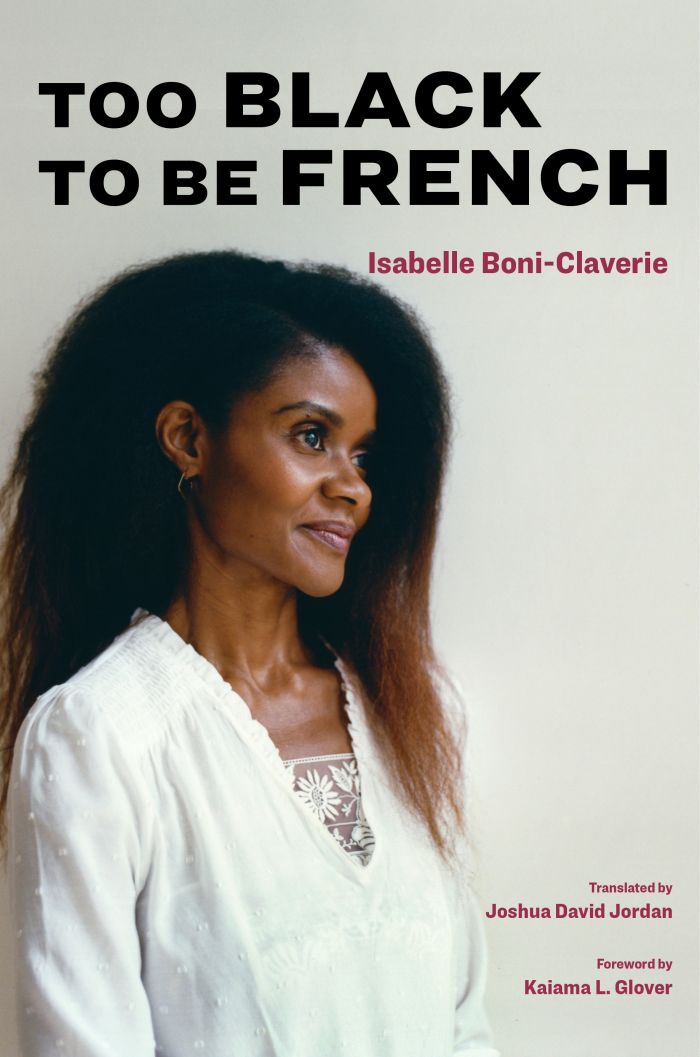Too Black to Be French

This book can be opened with

Winner, Grand Prize, French Voices Award
In Too Black to Be French, Isabelle Boni-Claverie navigates the complexities of identity, race, and family in a world that constantly questions her belonging. Boni-Claverie's singular account interweaves the extraordinary life experiences of three generations of her family: her grandfather from Ivory Coast, who married a middle-class white woman from southern France in the 1930s; her biological parents, and her mixed-race aunt and white upper-class uncle who adopted her; as well as her own life as a successful film director and writer faced with abiding stereotypes and discrimination.
Written with humor and aplomb, Boni-Claverie’s narrative examines the enduring effects of France’s colonial past and the deep-seated structural prejudices affecting Black people in a country that prides itself on stories of its hospitality toward African Americans fleeing segregation. Updating this picture to reveal the complexities and challenges of being Black in France where discussion of race is often taboo, Boni-Claverie offers an American readership rare insights into racial dynamics on both sides of the Atlantic.
Too Black to Be French is at once a sociological portrait of France, a multicultural family album, and a transatlantic coming-of-age story. It will appeal to readers eager for a passionate fresh voice devoted to better understanding the challenges of today’s world and the courage it takes to overcome them. Through vivid storytelling, Boni-Claverie invites readers to traverse a path filled with emotional depth, cultural introspection, and a quest for acceptance.
Isabelle Boni-Claverie offers us a powerful work that explores with depth and honesty the complex realities of Black identity in France. Through her personal story and clear-eyed analyses, she highlights the insidious discrimination and challenges faced by Black people in contemporary French society. An illuminating read for anyone looking to understand the mechanisms of systemic racism.—Rokhaya Diallo, author of Racism: A Guide
This book is one of the greatest pleas against exclusions that have so far prevented France from becoming aware of the diversity of its population.—Alain Mabanckou, author of Black Moses
At this particular moment in time, when France’s minority populations—peoples of color, descendants of empire—are demanding with increasing force that France grapple meaningfully with the nation’s past and recalibrate its present conditions of citizenship and belonging, the notion that a citizen of the republic can be ‘too Black to be French’ is a profoundly necessary provocation.—Kaiama L. Glover, from the Foreword
Isabelle Boni-Claverie is a French filmmaker, screenwriter, and author. At eighteen, she won second prize for the Young Francophone Writer Award for her first novel, La Grande Dévoreuse. In 2005, Danny Glover asked her to adapt Valérie Tong Cuong’s novel, Où je suis, into the screenplay Heart of Blackness. She has since written numerous television dramas and series, including the comedy Sex, Okra and Salted Butter (ARTE), Seconde Chance (TF1), Coeur Océan (France 2), and Plus Belle La Vie (France 3), the most watched TV series in France. Two of her first short films, Pour la nuit and Le Génie d’Abou won international awards. Broadcast for the first time on the Franco-German television channel ARTE in 2015, her documentary Too Black to Be French? was a hit both with audiences and the media and screened internationally. She has produced and cowritten a documentary about diversity at the Paris Opera that will air on ARTE this year.
Kaiama Glover (Foreword By)
Kaiama L. Glover is Ann Whitney Olin Professor of French and Africana Studies at Barnard College. She is the author of A Regarded Self: Caribbean Womanhood and the Ethics of Disorderly Being (2020) and Haiti Unbound: A Spiralist Challenge to the Postcolonial Canon (2010).
Joshua David Jordan (Translator)
Joshua David Jordan is Senior Lecturer in French at Fordham University. He has translated works by Etienne Balibar, Jean Hatzfeld, and David Lapoujade and is a two-time winner of the French Voices Award.
Foreword by Kaiama L. Glover | vii
Acknowledgments | xiii
1. If Only You’d Been Lighter | 1
2. A Black Princess and White Nannies | 5
3. You Will Play Balthazar, My Dear | 11
4. Does Class Erase Race? | 18
5. A “Little French Girl” in Ivory Coast | 27
6. My Grandfather, Alphonse Boni | 33
7. Slavery and the Holocaust: Why I Am a Humanist | 44
8. When My Grandmother Married a Black Man | 54
9. An “African Girl” in Bordeaux | 64
10. What Color Is the French Language? | 77
11. Why Race Trumps Class | 83
12. Alphonse and Rose-Marie: A Mixed-Race Couple in the Colonies | 88
13. A Little Story About Discrimination | 97
14. My First Black Role Models | 103
15. The Adventure of Revue Noire | 111
16. French “Integration” | 121
17. Where Are You From? | 127
18. Coming Out of the Race Closet | 134
19. Good Hair | 141
20. Alphonse’s Dilemmas | 156
21. Fault Lines | 173
22. French TV: Keeping Out the Color | 183
23. The White Norm | 201
24. Run, Black Man, Run! | 210
25. The Guerlain Affair | 215
26. The Three Fears | 230
27. On the Advantage of Being White | 240
28. In It Together | 245
29. That’s a Wrap | 257
Notes | 263




